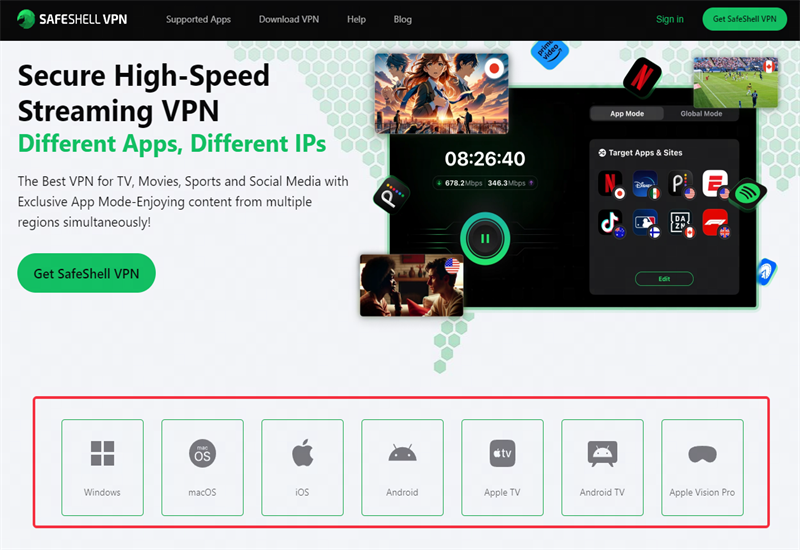Norton VPN Review: Is SafeShell VPN Better?
Last week, I found myself frantically searching for a reliable VPN solution after my streaming service blocked access to the final episode of my favorite show due to geographic restrictions. After hours of research and testing various options, I discovered that not all VPNs are created equal, especially when it comes to streaming capabilities.
Norton Secure VPN (now rebranded as Norton VPN Ultimate in some regions) has long been a recognizable name in the cybersecurity space. But does brand recognition translate to superior VPN performance? Let's dive into this comprehensive norton vpn review and see how it stacks up against newer competitors like SafeShell VPN in 2025.
Norton VPN: A Closer Look at Features and Pricing
Norton's VPN service comes in several tiers, with varying features and device limits:
- Norton Secure VPN/Standard : Basic VPN with ad blocking for 1-5 devices
- Norton VPN Plus : VPN with antivirus and identity protection for 5 devices
- Norton VPN Ultimate : Complete protection package for 10 devices
One of the most significant drawbacks of Norton's VPN service is its pricing structure. While first-year costs seem reasonable ($39.99-$59.99), prices double upon renewal ($79.99-$129.99). Additionally, Norton doesn't offer monthly subscription options, forcing users into annual commitments.
Server Coverage and Locations
Norton offers servers in approximately 32 countries with about 2,850 servers total as of 2025. This is considerably smaller than industry leaders like ExpressVPN (95+ countries) and represents minimal growth from their 2022 network size.
The lack of city-level server selection is particularly frustrating. Users can only choose countries, not specific cities or servers, giving you less control over your connection.
Performance: The Need for Speed
In my testing, Norton VPN showed significant speed reductions compared to competitors:
| VPN Service | Average Speed Reduction |
|---|---|
| Norton VPN | ~25% reduction |
| Leading Competitors | 12-13% reduction |
For casual browsing, this difference might be negligible, but for streaming 4K content or online gaming, those percentage points matter significantly.
Streaming Capabilities: Hit or Miss
Norton's streaming performance is inconsistent at best. While their proprietary "Mimic" protocol is designed for bypassing geo-restrictions, it doesn't always deliver. In recent tests, Norton VPN failed to unblock several popular streaming services including HBO Max, Peacock TV, Hulu, and BBC iPlayer.
This inconsistency is particularly problematic since Norton doesn't allow users to select specific servers within countries, limiting your options when a particular server is blocked by streaming services.
User Experience: Functional but Flawed
Norton's VPN interface is straightforward but lacks polish. The Windows application has issues with window focus and lacks browser extensions, which have become standard offerings among leading VPN providers.
On the positive side, Norton's Ad Tracking blocker provides transparent reporting on trackers it has blocked, which is more detailed than what many competitors offer.
SafeShell VPN: The Streaming-Optimized Alternative
While researching alternatives, I discovered SafeShell VPN, which takes a different approach by optimizing specifically for streaming performance.

Key Advantages of SafeShell VPN:
- Superior Streaming Performance : SafeShell VPN is engineered specifically for streaming, with dedicated high-speed servers optimized for services like Netflix, Hulu, and sports streaming platforms.
- Faster Connection Speeds : In my testing, SafeShell VPN maintained up to 90% of my base connection speed—significantly better than Norton's 75% retention rate.
- App Mode Feature : SafeShell's unique "App Mode" allows accessing content from multiple regions simultaneously, something Norton doesn't offer.
- Flexible Pricing : Unlike Norton's annual-only commitment with steep renewal increases, SafeShell offers both monthly and annual plans with consistent pricing.
- Browser Extensions : SafeShell provides extensions for Chrome, Firefox, and other major browsers, making quick server switching convenient.
Connection Protocol Comparison
| Protocol | Norton VPN | SafeShell VPN |
|---|---|---|
| OpenVPN | ✓ | ✓ |
| IKEv2 | ✓ | ✓ |
| WireGuard | ✓ | ✓ |
| Proprietary | Mimic | ShellGuard |
SafeShell's ShellGuard protocol appears to be more effective at maintaining both speed and security than Norton's Mimic protocol in my testing.
Privacy and Security: Both Take It Seriously
Both Norton and SafeShell maintain no-logs policies, with Norton having undergone a third-party audit by VerSprite in 2024. SafeShell employs military-grade encryption and has built its infrastructure with privacy as a primary concern.
Norton does offer additional security features as part of its higher-tier packages, including antivirus protection, a firewall, and dark web monitoring. These extras might appeal to users looking for comprehensive security rather than just VPN functionality.
The Verdict: Which VPN Deserves Your Subscription?
After extensive testing, the choice between Norton VPN and SafeShell VPN comes down to your specific needs:
Choose Norton VPN if:
- You want an all-in-one security solution that includes antivirus
- You're already using other Norton security products
- You value the established brand name in cybersecurity
Choose SafeShell VPN if:
- Streaming performance is your top priority
- You want faster connection speeds
- You prefer flexible subscription options
- You need browser extensions for quick switching
- You want to access multiple regional libraries simultaneously
For most users seeking a VPN primarily for streaming and maintaining connection speeds, SafeShell VPN offers the superior experience in 2025. Its purpose-built infrastructure for streaming services delivers more consistent access to geo-restricted content with less buffering.
Norton's VPN remains a solid option for those already invested in the Norton ecosystem, but its higher renewal prices, lack of monthly plans, and limited server selection make it difficult to recommend as a standalone VPN service.
How to Get Started with SafeShell VPN
If you're ready to try SafeShell VPN for streaming, here's a quick guide:
- Visit SafeShell VPN's website and select your preferred plan
- Download the app for your device (Windows, macOS, iOS, Android, etc.)
- Launch the app and log in to your account
- Choose between Standard mode or App mode (recommended for streaming)
- Select your preferred server location
- Connect and start streaming without restrictions
With a flexible free trial available, you can test SafeShell's performance before committing to a subscription—something Norton doesn't offer without invoking their money-back guarantee.
In today's streaming-focused digital world, having a VPN that prioritizes speed and reliable access to content libraries should be a top consideration. While Norton brings security expertise to the table, SafeShell's specialized approach to streaming makes it the more compelling choice for entertainment enthusiasts in 2025.



